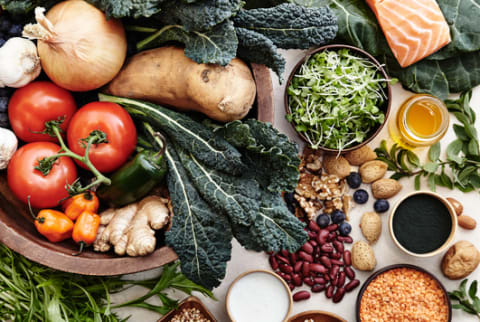Advertisement
The Alkaline Foods You Need To Nourish Your Skin All Winter



Each time we eat an acid-forming food, our body needs to bring our blood pH levels back to a state of equilibrium, and it does this by releasing alkaline-rich minerals such as calcium, phosphorus, and magnesium into our bloodstream.
The trouble is that if we aren't eating enough alkaline-forming foods to make this process happen naturally, then the body needs to locate and use those minerals from elsewhere in the body. So it looks to our bones, teeth, and organs and finds and utilizes the minerals found there, which may result in a compromised immune system and decrease in energy levels.
Eating an alkaline diet will help keep your body and pH levels in balance. In your body, blood pH levels need to maintain a slightly alkaline level in order to keep you strong and healthy. You can maintain this balance by eating more alkaline-forming foods such as fruits, veggies, nuts, and herbs.
As a general rule, stick to these tips and you'll be on your way to alkalinity!
Eat the orange spectrum.
Brightly colored orange foods such as apricots, carrots, winter squash and pumpkin are all great to dive into this winter. Flavonoids, the natural pigments that give plants their color, have antioxidant, alkalizing, and cell-protecting, properties. All root vegetables will provide some alkalizing benefits, yet carrots offer a special punch all on their own. Try using them in your next green juice, raw in dishes of all kinds, or even roast them in the oven slightly to add a caramelized flavor. Sweet potatoes also provide similar benefits.
Load up on garlic.
Garlic is a moderately alkalizing immunity-boosting superstar that's available all year round. One clove of garlic contains more than 100 sulfuric compounds that are powerful enough to wipe out bacteria and infection. Adding garlic to your meals or drinking garlic tea will provide you with an injection of empowering and immune-boosting ammunition this winter season.
Try turmeric.
Turmeric, a pungent spice, which has many amazing benefits for the body, contains curcumin, a compound that increases the level of immunity-boosting proteins in our bodies. These proteins help fight bacteria and viruses when they try to attack. Turmeric is also a natural anti-inflammatory and painkiller, an added benefit if you're actively fighting a flu virus.
Sip soups.
Use vegetables instead of adding stock cubes or prepared casserole mixes, which are usually full of unnecessary additives and excess oils. Soups are a wonderful winter version of salads, and you can get really creative once you have made a base of celery, onions, garlic and peppers with some stock; then you can throw in whatever alkalizing vegetables you have on hand and make new variations as you like!
Keep on reading: